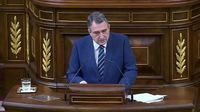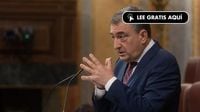Aitor Esteban, the spokesperson for the Basque Nationalist Party (PNV) in Congress, urged Spanish Prime Minister Pedro Sánchez on Wednesday to provide specific plans for strengthening European defense before the upcoming summer. During his address at a plenary session in Congress, Esteban emphasized the necessity for a broader coalition beyond Sánchez's left-wing allies, who have shown resistance to increasing defense spending. He stated, "We can no longer remain in this uncertainty," highlighting the need for clarity and commitment to advancing defense initiatives.
Esteban's remarks come in the wake of a plan announced by Sánchez to bolster the defense and security industry, a move deemed crucial given the current international context. The PNV spokesperson called for the European Union (EU) to significantly increase its investments in research, development, and innovation (R&D&I) related to European production. He argued that the EU must enhance its spending on defense procurement by 100%, asserting that "defense and competitiveness are absolutely interrelated."
He further advocated for the EU to achieve greater independence in its defense capabilities. "We cannot have each country doing whatever it pleases; we need to coordinate to invest wisely," Esteban stressed, underscoring the importance of a unified European foreign policy. He warned that failing to do so would leave Europe vulnerable to external influences, resulting in political, military, and economic decline.
Esteban's call for unity comes amid concerns over the lack of consensus within the Spanish government regarding defense spending. He pointed out that the current divisions between the Socialist Workers' Party (PSOE) and its left-wing allies, including Sumar, hinder effective decision-making. "What is at stake transcends even the governance of the country; we are talking about how to build the European future, which is essential for the well-being of all citizens in the state," he stated.
The Junts spokesperson in Congress echoed Esteban's sentiments, acknowledging that Europe is entering a new era where reliance on U.S. protection is no longer viable. This spokesperson called for decisive action in defense and security matters, advocating for increased industrial and technological investment to reduce dependency on U.S. defense contracts. They pointed out that a significant portion of Europe's defense materials currently comes from American companies, which means that any increase in military spending effectively benefits the U.S. economy.
Furthermore, the Junts representative emphasized the need for the EU to recognize and incorporate Catalonia's industrial capabilities in the new European security architecture. This call for inclusivity highlights the importance of regional contributions to national and continental security strategies.
In a similar vein, Cristina Valido, the spokesperson for the Canary Islands Coalition (CC), urged Sánchez to exhibit transparency regarding defense spending, arguing that the current geopolitical climate demands clarity rather than ambiguous statements. Valido noted that international disputes extend beyond mere borders and into the realm of resources, urging Europe to strengthen its southern borders to ensure security and independence. "We need to rise to the occasion demanded by the moment," she asserted, warning that failure to do so could lead to historical embarrassment.
Alberto Catalán, a deputy from the Union of the Navarrese People (UPN), criticized the fact that it took U.S. President Joe Biden to force Europe to confront its defense shortcomings. He expressed concern that Sánchez's allies have left him isolated in his European rearmament plan, calling for clarity on the parliamentary support and financial commitments necessary to advance this initiative. Catalán's remarks underscore the political challenges facing Sánchez as he navigates the complex landscape of defense spending amidst varying opinions within his coalition.
The discussions in Congress reflect a growing recognition among European leaders that the continent must take a more proactive stance on its defense strategy. With geopolitical tensions rising globally, the call for a unified European defense policy has never been more urgent. As Esteban aptly put it, "Europe is playing for its future and that of its citizens."
As the situation unfolds, the upcoming months will be critical for determining how Europe will respond to these challenges and whether it can achieve the necessary consensus to bolster its defense capabilities effectively. The stakes are high, and the path forward will require cooperation and commitment from all member states to ensure a secure and independent Europe.






